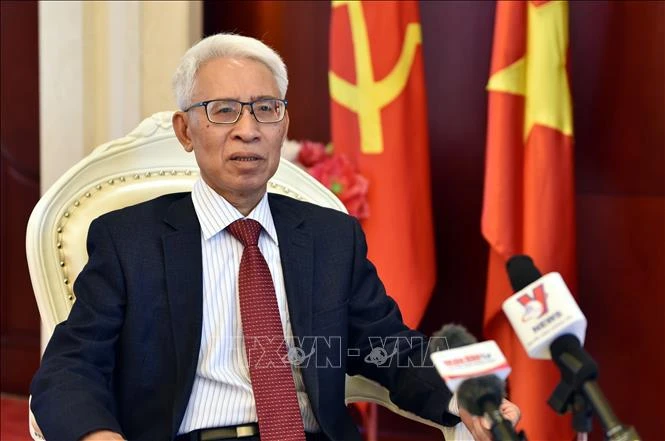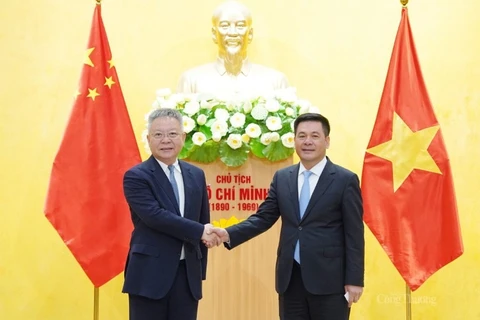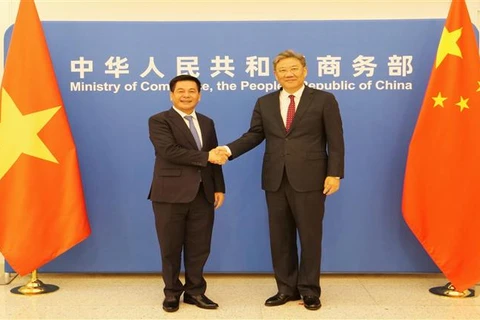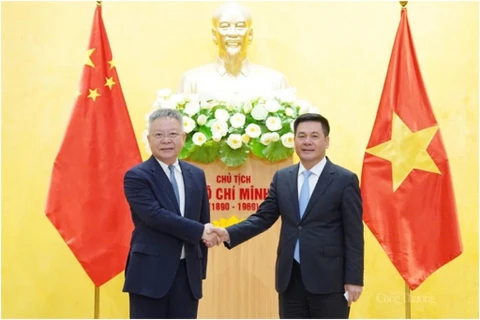
Beijing (VNA) – The official visit to Vietnam by Chinese Premier Li Qiang from October 12 to 14 is significant to further enhance the comprehensive strategic cooperative partnership between the two countries and promote the building of a Vietnam - China community with a shared future that carries strategic significance in the direction of the “six major goals”, Vietnamese Ambassador to China Pham Sao Mai has said.
In an interview granted to the Vietnam News Agency, Mai stated that this will be the first visit to Vietnam by a Chinese Premier in 11 years and also the first by Li as the Chinese Premier, demonstrating the respect of the Chinese Party and State and Li himself for the relations with Vietnam.
The trip takes place in the context that the two nations are gearing towards the 75th anniversary of their diplomatic relations (January 18, 1950-2025) as well as following the state visits by General Secretary of the Communist Party of China Central Committee and Chinese President Xi Jinping to Vietnam in December 2023 and General Secretary of the Communist Party of Vietnam Central Committee and State President To Lam to China in August and a tour of China by Prime Minister Pham Minh Chinh for the World Economic Forum Annual Meeting of the New Champions and working sessions in the country in June.
During his stay in Vietnam, Li is scheduled to hold talks and have meetings with Party General Secretary and State President To Lam, PM Pham Minh Chinh, and Chairman of the National Assembly Tran Thanh Man, the diplomat said, adding high-ranking leaders of both sides will discuss measures to continue carrying out the efficacy of the common perceptions reached by the top leaders of the two parties and states and those to further consolidate political trust.
Of note, the two PMs will focus their discussion on specific solutions to expanding and improving the efficiency and quality of cooperation areas, aiming at deepening substantive collaboration and bringing benefits to the two peoples, he said.
Touching on the standout features in the bilateral relations over the past time, particularly after they set up their comprehensive strategic cooperative partnership between the two countries, Mai highlighted that during Xi’s state visit to Vientam in December last year, high-ranking leaders of the two parties and states concurred to build a Vietnam - China community with a shared future that carries strategic significance and strive for the happiness of the two people and for peace and progress for humanity.
On the basis of the direction of the “six major goals” agreed between the high-ranking leaders, the bilateral relations have maintained robust growth momentum, with the cooperation spirit having spread strongly to all levels and sectors and important achievements having been obtained in all areas.
Mai elaborated that exchanges at all levels have been promoted through flexible forms, contributing to enhancing political trust and consolidating the political foundation of the relations between the two parties and states. The historic visits by late Party chief Nguyen Phu Trong to China in October 2022, Xi to Vietnam in 2023 and Lam to China in 2024 have resulted in positive, comprehensive and substantive collaboration in all areas, contributing to peace, stability and development in the region and the world.
During their meetings, the Vietnamese side affirmed it always considers the relations with China as a leading priority in its foreign policy of independence, self-reliance, multilateralism and diversification of external relations, while the Chinese side highlighted its consistency with the friendship policy with Vietnam and said it always sees Vietnam a priority in its neighbourhood diplomacy.
Mai went on to say that the bilateral cooperation in economy, trade and investment has been developed in a deeper and more substantive fashion, with China having been the largest trading partner and the second export market of Vietnam, while Vietnam having been the largest trading partner of China in ASEAN and fifth largest trading partner in the world, following the US, Japan, the Republic of Korea and Russia. During January - September, two-way trade totalled 148.6 billion USD, with Vietnam exporting 43.6 billion USD worth of products to China and spending 105 billion USD on imports from China.
Trade revenue between the two nations could hit 200 billion USD by the end of the year on the back of strong trade growth in the first half. The two sides are working to promote infrastructure connectivity, including railway, highway, and border gate infrastructure, while upgrading “soft connectivity” regarding smart customs and smart border gates to facilitate and improve trade exchange between the two sides.
During the nine-month period, China was the second largest investor in Vietnam with total registered capital of 3.2 billion USD, accounting for 13% of the FDI in Vietnam. The two sides are working closely with each other to remove bottlenecks in several economic cooperation projects.
The two countries, he said, have enjoyed encouraging and practical results in the cooperation in culture, education, tourism and people-to-people exchange. They have also obtained various achievements in building a land border line of peace, friendship, cooperation and sustainable development, and made efforts to maintain discussions and control disagreements at the sea in accordance with international law, including the 1982 United Nations Convention on the Law of the Sea, carry out negotiation mechanisms on sea issues, promote the full and effective implementation of the Declaration of the Conduct of Parties in the East Sea (DOC), and strive to develop a substantive and effective Code of Conduct, making contributions to ensuring peace and stability in the East Sea and the region.
Additionally, they have coordinated at multilateral forums to promote peace, stability and cooperation in the region and the world as well as enhance the central role of ASEAN and respect for the UN Charter and international law.
The Ambassador expressed his hope for specific and substantive outcomes of Li’s visit, with various measures put forth to bring into full play the common perceptions reached by leaders of the two parties and states as well as the signing of many cooperation documents.
The visit will create impetus for the Vietnamese sectors, branches and localities to maintain and expand their relations with the Chinese sides, helping consolidate the solid social foundation for the development of the bilateral ties, he stated.
He said he believes that on the basis of the advantages, potential, demands and existing sound relations as well as joint resolve and efforts of the two parties, states and peoples, the Vietnam - China comprehensive strategic cooperative partnership will thrive in the coming time for the interests of the two peoples and for peace, stability, cooperation and development in the region and the world.
Vietnam and China are working closely to organise celebrations, people-to-people exchanges, and cultural and art activities to mark the 75th anniversary of their diplomatic relations next year, giving the two peoples, particularly the younger generations, a deeper insight into the culture and customs of each other as well as their time-honoured friendly neighbourhood, he said, adding the events will help foster the comprehensive strategic cooperative partnership between the two countries and the Vietnam - China community with a shared future that carries strategic significance./.






















